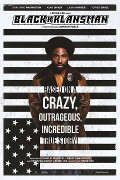
USA 2018
Directed by
Spike Lee
134 minutes
Rated M
Reviewed by
Bernard Hemingway

Black Klansman
Synopsis: At the height of the civil rights movement Ron Stallworth (John David Washington) becomes the first African-American to serve in the Colorado Springs Police Department. Determined to make a name for himself he teams up with a colleague, Flip Zimmerman (Adam Driver), to infiltrate, expose and bring down the local chapter of the Klu Klux Klan.
As we know, Spike Lee, bless his soul, is not given to understatement but, wow, with his latest film he comes at us with a battering ram. I haven’t yet seen his previous film, Chi-raq (2015), which did not get a theatrical release here and which addressed the issue of out-of-control violence in the black communities of Chicago’s Southside but BlacKkKlansman also evidences his passionate concern for black America. As we realize from the closing montage of 2017 news footage of White Supremacist rallies in Charlotteville Virginia, although set in the early 1970s, much as was the case with his 1989 break-out film Do The Right Thing, Lee’s aim is to draw attention to recrudescent racism in Trump’s America and to ask “what are you going to do about it?”. Admittedly this question will have greater purchase in the USA than here but still for an Australian audience the film will be an eye-opener at he same time as it entertains.
As much as Lee is unapologetically didactic in his mission, stopping just short of using Powerpoint displays but employing footage from D.W.Griffith’s Birth of a Nation (1915) and enlisting Harry Belafonte to tell the story of the brutal lynching of Jesse Washington in Waco Texas in 1916 (there is some small irony in that Lee’s co-lead here John David Washington, son of Denzel who starred in Lee’s early films, notably Malcolm X (1992) shares the same surname) the story of BlacKkKlansman, as an opening title tells us, is “some fo’ real fo’real shit”.
In what is an almost too bizarre to be true tale we learn how Ron Stallworth, a black novice detective decided to infiltrate the KKK by pretending to be a White Supremacist and immediately got on the wrong foot by using his own name on the phone when he answers one of their recruitment ads. He has to enlist his white Jewish colleague, Flip, as his beard and the two Ron Stallworths work their way into “the Organisation” ingratiating themselves with the KKK’s national director, David Duke (Topher Grace).
In a way that recalls the more jocular treatment of the neo-Nazis in The Blues Brothers (1980) Ron and Flip get away with their ruse because the Klansmen are depicted with caricatural glee as completely clueless, something which Lee brings home, and in doing so provides us with a good deal of satisfaction, when the most moronic and dangerous of the group seriously bungle their attempt to teach some uppity blacks a lesson. If Lee’s anger is palpable, his ridiculing of White Supremacism (acerbically stated in an opening sequence in which Alec Baldwin plays a frothing-at-the-mouth old school Southern bigot) saves him from being caught in a vortex of hate. He also leavens proceedings somewhat with a side serve of Stallworth’s burgeoning romance with an Angela Davis-like activist played by Laura Harrier.
Despite having the fillip of being a "true story" I must say that I was a little disconcerted by how much support Stallworth had from the Colorado Springs police department, particularly from Chief Bridges (Robert John Burke), and how easily, many close shaves notwithstanding, Ron and Flip pulled off their scam. Fiction could not have been more obliging. This is, however, not a major sticking point as no-one will be interested in defending the villains here.
Although taken out of context some may well find Lee’s film a tad too heavy-handed, especially for fans of the director, who gives us plenty of his characteristic visual flourishes including a trademark double dolly shot at the film’s end, BlacKkKlansman is well worth the ticket.
FYI: I never knew until this film that Steve Buscemi had a brother, Michael, who appears here as Ron dn Flip’s colleague, Jimmy.

Want more about this film?


Want something different?




